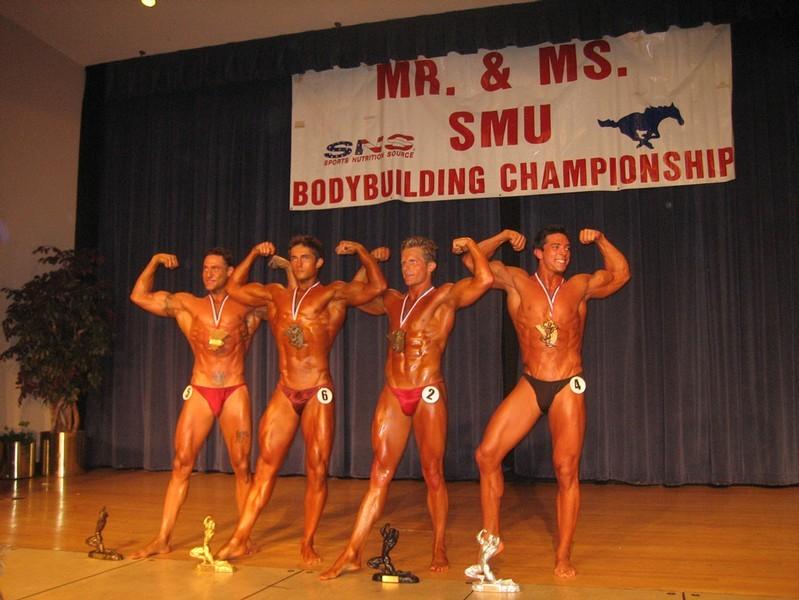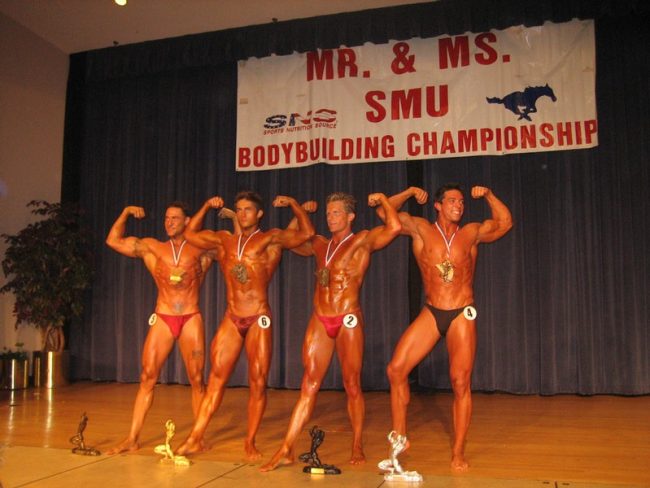
Beyond the competition (Photo courtesy of Michael Nguyen)
Muscular men behind a curtain downing bottles of red wine, spraying each other tan and pumping iron at the same time is a sight most would call unusual-unless you are at a bodybuilding competition.
Last night was the eighth annual Mr. and Ms. SMU bodybuilding championship, an all natural competition that judges the toned human physiques of SMU students.
Although this year marked the largest male entry in the history of the competition, there were no female participants due to injuries.
But that didn’t stop the crowd made up of former bodybuilders, family, friends and the SMU swim team from being rowdy and responsive to the men flexing their muscles.
Being an all-natural competition, there are no steroids taken to achieve their chiseled biceps and washboard abs, although one might think it impossible at first glance.
“Don’t be too quick to judge these men as taking steroids and being meatheads,” warns Jacob Harvison, former Mr. SMU and trainee for the Bodybuilding Collegiate Nationals. “This sport takes a lot of dedication and intense sacrifice.”
The sacrifice he is referring to is the hard-core dieting and training. In fact, some of the men trained for 15 years before entering a bodybuilding competition. But “the weight lifting and cardio is the fun part,” explains Mr. SMU 2004, Alex Cherones.
“It’s the dieting that is extremely difficult and the most challenging, because it takes a while to figure out what works for your body and what doesn’t,” Cherones said.
For months before this competition the bodybuilders began dieting, which typically consists of eight egg whites and a cup of oatmeal in the morning and five more meals strategically scattered throughout the day.
But the week before the event is a completely different story. Well-trained competitors confine themselves to drinking just a few ounces of water a day to drop the excess water weight and make their muscles appear more defined. And Jeff Rose, the 31-year-old third place recipient, had his roommate calculating his caloric intake to the gram.
But after the competition, “Most of these guys will gain 10 pounds in a week and 30 pounds in two months.
The last few days will definitely throw your body out of whack and it makes you very irritable and cranky, but nothing can touch your high right before the competition, not even the lack of energy,” said Cherones.
Although Kean Matthams, the new SMU champion, reported being burned out during the week approaching the competition, it was the mental high that got him through the exhausting posing (but the jug of water and boxes of Krispy Kreme waiting for him after the competition might have been a booster as well).
So you might be asking yourself, “Why bother putting your body through so much strain for one day of competition?” The answer is simple for those into fitness: “It’s a lifestyle and nothing more. Not the dieting part so much, but the staying healthy and exercising is addicting,” said Cherones.
This was already a lifestyle for Matthams even before entering the event, so like many other participants he looked at this competition as a way to push himself to achieve a challenging goal.
And after three years of serious training he can finally say it was a success. “This experience has taught me commitment, discipline and organization, which is great because they have transferred to all aspects of my life.”
These life lessons are the reasons Tim Moore started this competition in 1998. Moore, former Mr. Louisville, refers to bodybuilding as “one of the most positive experiences.
“It is in competitions like these, where everyone has suffered together, that you gain these experiences, because you train in a supportive environment where you appreciate everyone for their dedication and hard work. It is the camaraderie among participants that makes the pain and sacrifice worthwhile,” he said.
Because the preparation for this competition is so brutal, many of this year’s competitors may not return next year. Some, like participant Kyle Brinkley, take a year off and return with a new energy, because “it’s a challenge that is fun and provides a competitive outlet for those not involved in collegiate sports.”









